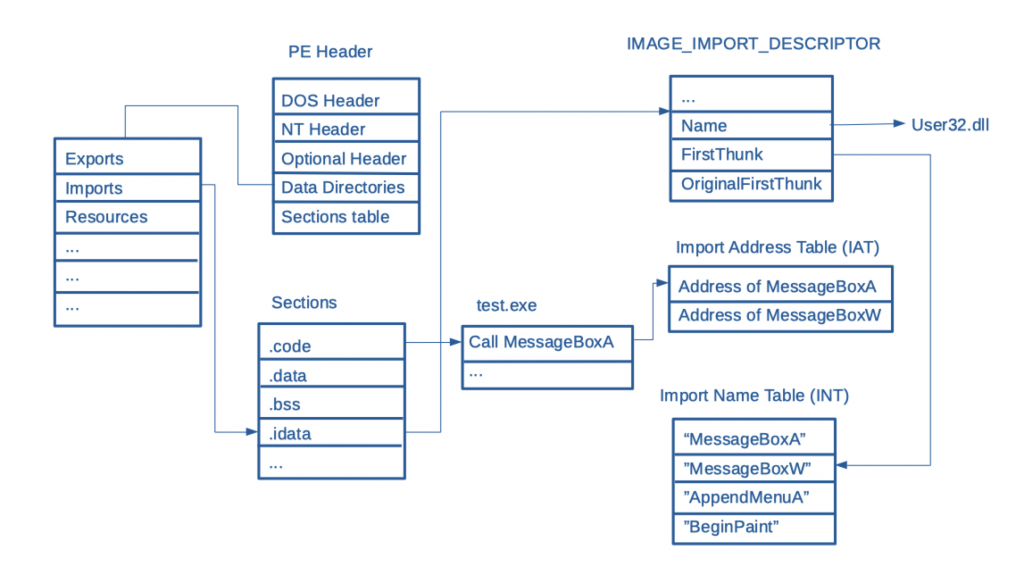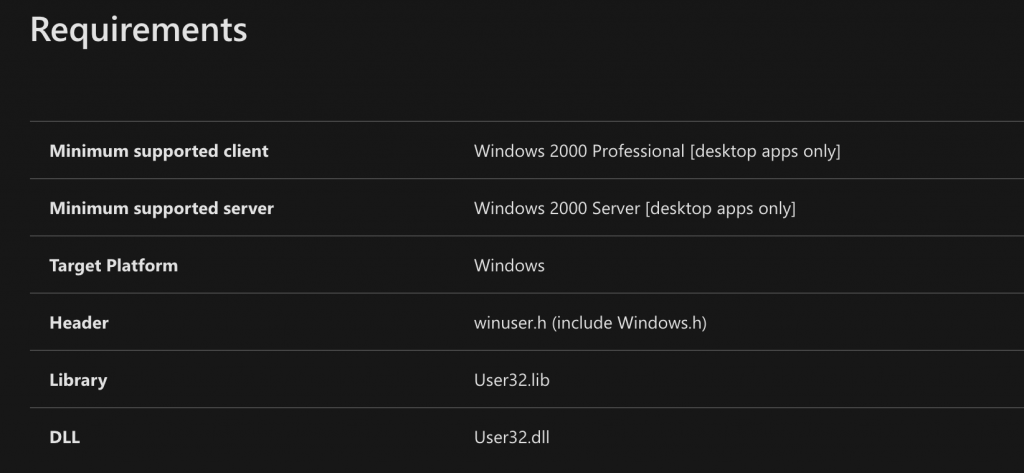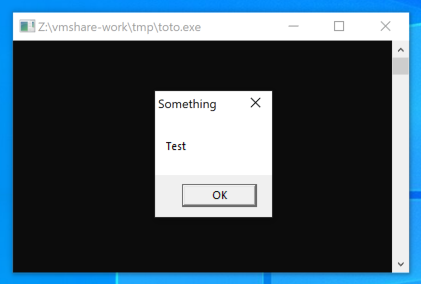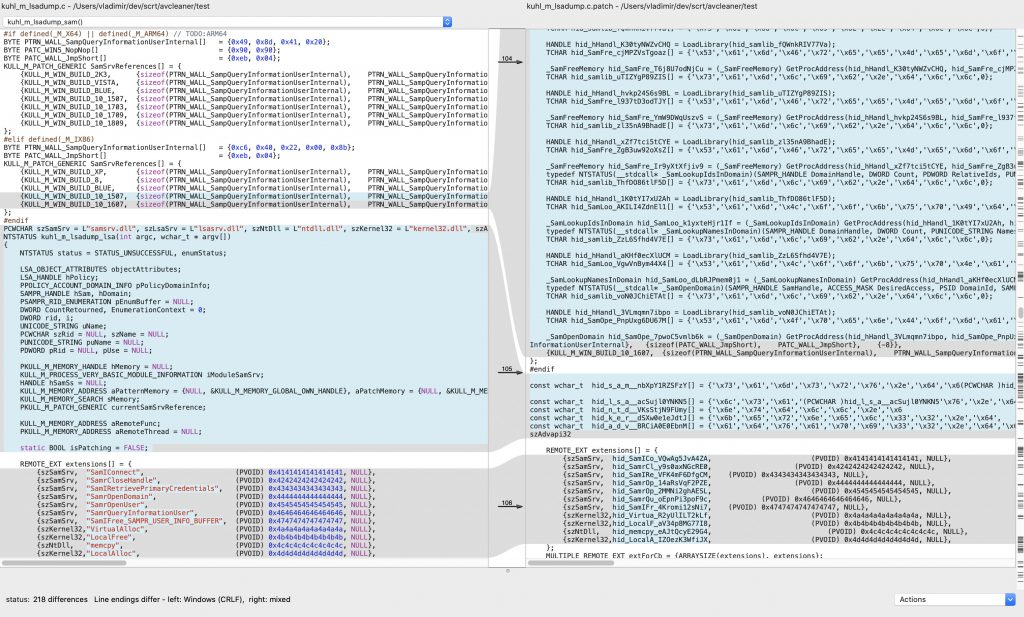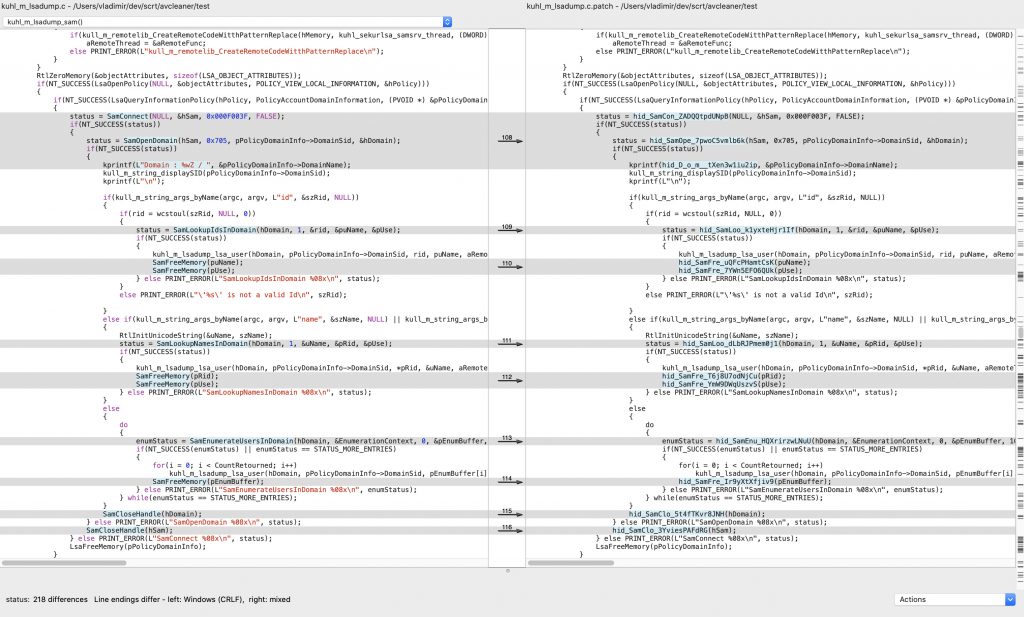tl;dr To interact with the Windows operating system, software often import functions from Dynamic Link Libraries (DLL). These functions are listed in clear-text in a table called Import Address Table and antivirus software tend to capitalise on that to infer malicious behavioural detection. We show ideas and implementation of an obfuscator that allows to refactor any C/C++ software to remove this footprint, with a focus on Meterpreter. The source code is available at https://github.com/scrt/avcleaner.
Introduction
In a previous blog post, we showed how to replace string literals in source code accurately without using regexes. The goal is to reduce the footprint of a binary and blind security software that relies on static signatures.
However, apart from string literals in the source code itself, there are plenty of other fingerprints that can be collected and analysed statically. In this blog post, we will show how one can hide API imports manually from a binary, and then automate the process for every software written in C/C++.
The problem with API imports
Let us write and build a simple C program that pops up an alert box:
#include <Windows.h>
int main(int argc, char** argv) {
MessageBox(NULL, "Test", "Something", MB_OK);
return 0;
}Then, build with your favorite compiler. Here, MinGW is used to cross-build from macOS to Windows:
x86_64-w64-mingw32-gcc test.c -o /tmp/toto.exeAfterwards, one can list the strings using rabin2 (included in radare2), or even the GNU strings utility:
rabin2 -zz /tmp/toto.exe | bat
205 вФВ 201 0x00003c92 0x00408692 7 8 .idata ascii strncmp
206 вФВ 202 0x00003c9c 0x0040869c 8 9 .idata ascii vfprintf
207 вФВ 203 0x00003ca8 0x004086a8 11 12 .idata ascii MessageBoxA
208 вФВ 204 0x00003d10 0x00408710 12 13 .idata ascii KERNEL32.dll
209 вФВ 205 0x00003d84 0x00408784 10 11 .idata ascii msvcrt.dll
210 вФВ 206 0x00003d94 0x00408794 10 11 .idata ascii USER32.dll
...
9557 вФВ 9553 0x0004f481 0x00458e81 30 31 ascii .refptr.__native_startup_state
9558 вФВ 9554 0x0004f4a0 0x00458ea0 11 12 ascii __ImageBase
9559 вФВ 9555 0x0004f4ac 0x00458eac 11 12 ascii MessageBoxA
9560 вФВ 9556 0x0004f4b8 0x00458eb8 12 13 ascii GetLastError
9561 вФВ 9557 0x0004f4c5 0x00458ec5 17 18 ascii __imp_MessageBoxA
9562 вФВ 9558 0x0004f4d7 0x00458ed7 23 24 ascii GetSystemTimeAsFileTime
9563 вФВ 9559 0x0004f4ef 0x00458eef 22 23 ascii mingw_initltssuo_force
9564 вФВ 9560 0x0004f506 0x00458f06 19 20 ascii __rt_psrelocs_startAs evident from the console output shown above, the string MessageBoxA appears three times. This is due to the fact that this function must be imported from the library User32.dll (more on this later).
Of course, this string in particular is not susceptible to raise an antivirus’ eyebrows, but that would definitely be the case for APIs such as:
- InternetReadFile
- ShellExecute
- CreateRemoteThread
- OpenProcess
- ReadProcessMemory
- WriteProcessMemory
- …
Hiding API imports
Before going further, let us recapitulate the different ways available to developers to call functions in external libraries on Windows systems [1]:
- Load-time dynamic linking.
- Run-time dynamic linking.
Load-time dynamic linking
This is the default approach to resolve function in external libraries and is actually taken care of automatically by the linker. During the build cycle, the application is linked against the import library (.lib) of each Dynamic Link Library (DLL) it depends on. For each imported function, the linker writes an entry into the IAT for the associated DLL.
When the application is started, the operating system scans the IAT and maps all the libraries listed there in the process’ address space, and the addresses of each imported function is updated to point to the corresponding entry in the DLL’s Export Address Table.
Run-time dynamic linking
An alternative is to do it manually by first loading the corresponding library with LoadLibrary, and then resolving the function’s address with GetProcAddress. For instance, the previous example can be adapted in order to rely on run-time dynamic linking.
First, it is necessary to define a function pointer for the API MessageBoxA. Before jumping into that, let us share a small trick to remember the syntax of function pointers in C for those of us that find it unintuitive:
<return type> (*<your pointer name>)(arg1, arg2, ...);As you can see, it is the same syntax used to define functions, apart from the star operator (because it is a function pointer) and the parenthesis.
Now, we need the prototype of MessageBox, which can be copy-pasted from winuser.h from the Windows SDK or straight from MSDN:
int MessageBox(
HWND hWnd,
LPCTSTR lpText,
LPCTSTR lpCaption,
UINT uType
);Now, the aforementioned function pointer syntax can be updated with the correct information:
int (*_MessageBoxA)(
HWND hWnd,
LPCTSTR lpText,
LPCTSTR lpCaption,
UINT uType
);MSDN tells us that this function is exported by User32.dll:
So, the application must first load this library:
HANDLE hUser32 = LoadLibrary("User32.dll");Then, GetProcAddress can finally be used to assign the correct address to the function pointer defined above:
_MessageBoxA fMessageBoxA = (_MessageBoxA) GetProcAddress(hUser32, "MessageBoxA");From there, the original example must be adapted to call fMessageBoxA instead of MessageBoxA, which gives:
#include <Windows.h>
typedef int (*_MessageBoxA)(
HWND hWnd,
LPCTSTR lpText,
LPCTSTR lpCaption,
UINT uType
);
int main(int argc, char** argv) {
HANDLE hUser32 = LoadLibraryA("User32.dll");
_MessageBoxA fMessageBoxA = (_MessageBoxA) GetProcAddress(hUser32, "MessageBoxA");
fMessageBoxA(NULL, "Test", "Something", MB_OK);
return 0;
}The Windows.h include is only required for the data types HWND, LPCTSTR and UINT. Building and running this simple example spawns an alert box, as expected:
Final adaptation
Of course, running strings on toto.exe will still yield the strings “User32.dll” and “MessageBoxA”. So, those strings should ideally be encrypted, but the simple obfuscation trick shown in the previous blog post suffices to bypass antivirus detection. The end result would be:
#include <Windows.h>
typedef int (*_MessageBoxA)(
HWND hWnd,
LPCTSTR lpText,
LPCTSTR lpCaption,
UINT uType
);
int main(int argc, char** argv) {
char user32[] = {'U','s','e','r','3','2','.','d','l','l',0};
HANDLE hUser32 = LoadLibraryA(user32);
char messabox[] = {'M','e','s','s','a','g','e','B','o','x','A',0};
_MessageBoxA fMessageBoxA = (_MessageBoxA) GetProcAddress(hUser32, messabox);
fMessageBoxA(NULL, "Test", "Something", MB_OK);
return 0;
}This time, neither strings nor rabin2 are able to find the string (although a reverse-engineer sure will):
вЮЬ x86_64-w64-mingw32-gcc test.c -o /tmp/toto.exe
вЮЬ strings /tmp/toto.exe | grep MessageBox
вЮЬ rabin2 -zz /tmp/toto.exe | grep MessageBox
вЮЬ Automated source code refactoring
The same approach lengthily described in the previous blog post can be used to refactor an existing code-base, so that suspicious API are loaded at runtime and removed from the Import Address Table. To do that, we will build upon the existing work realised with libTooling.
Let us break down this task as follows:
- Generate the Abstract Syntax Tree for the previous, original example. This is required to understand how to manipulate the nodes to replace a function call.
- Locate all the function calls in a code-base for a given API with an ASTMatcher.
- Replace all the calls with another function identifier.
- Insert
LoadLibrary/GetprocAddresscalls just before each function call. - Check that it works.
- Generalise and obfuscate all the suspicious API.
The MessageBox application’s Abstract Syntax Tree
To view Clang’s Abstract Syntax Tree for the original MessageBox application, let us use that script (adapt the path to your Windows SDK):
WIN_INCLUDE="/Users/vladimir/dev/avcleaner"
CLANG_PATH="/usr/local/Cellar/llvm/9.0.1"
clang -cc1 -ast-dump "$1" -D "_WIN64" -D "_UNICODE" -D "UNICODE" -D "_WINSOCK_DEPRECATED_NO_WARNINGS"\
"-I" "$CLANG_PATH/include" \
"-I" "$CLANG_PATH" \
"-I" "$WIN_INCLUDE/Include/msvc-14.15.26726-include"\
"-I" "$WIN_INCLUDE/Include/10.0.17134.0/ucrt" \
"-I" "$WIN_INCLUDE/Include/10.0.17134.0/shared" \
"-I" "$WIN_INCLUDE/Include/10.0.17134.0/um" \
"-I" "$WIN_INCLUDE/Include/10.0.17134.0/winrt" \
"-fdeprecated-macro" \
"-w" \
"-fdebug-compilation-dir"\
"-fno-use-cxa-atexit" "-fms-extensions" "-fms-compatibility" \
"-fms-compatibility-version=19.15.26726" "-std=c++14" "-fdelayed-template-parsing" "-fobjc-runtime=gcc" "-fcxx-exceptions" "-fexceptions" "-fseh-exceptions" "-fdiagnostics-show-option" "-fcolor-diagnostics" "-x" "c++"And run it:
bash clang-astdump.sh test/messagebox_simple.c > test/messagebox_simple.c.astLocating function calls in source code basically amounts to finding AST nodes of type CallExpr. As pictured on the screenshot above, the function name that is actually called is specified in one of its child nodes, so it should be possible to access it later on.
Locate function calls for a given API
ASTMatcher is just what we need in order to enumerate every function call to a given function. First, it is important to get the syntax right for this matcher, since it is a bit more complicated that the one used in the previous blog post. To get it right, I relied on clang-query, which is an invaluable interactive tool that allows to run custom queries on source code. Interestingly, it is also based on libTooling and is much more powerful than what is showcased in this blog post (see [2]).
clang-query> match callExpr(callee(functionDecl(hasName("MessageBoxA"))))
Match #1:
/Users/vladimir/dev/scrt/avcleaner/test/messagebox_simple.c:6:5: note: "root" binds here
MessageBoxA(NULL, "Test", "Something", MB_OK);
^~~~~~~~~~~~~~~~~~~~~~~~~~~~~~~~~~~~~~~~~~~~~
1 match.
clang-query>Trial-and-error and tab completion suffice to converge quickly to a working solution. Now that the matcher is proven to work well, we can create a new ASTConsumer just like we did in the previous blog post. Basically, its job is to reproduce what we did with clang-query, but in C++:
class ApiCallConsumer : public clang::ASTConsumer {
public:
ApiCallConsumer(std::string ApiName, std::string TypeDef, std::string Library)
: _ApiName(std::move(ApiName)), _TypeDef(std::move(TypeDef)), _Library(std::move(Library)) {}
void HandleTranslationUnit(clang::ASTContext &Context) override {
using namespace clang::ast_matchers;
using namespace AVObfuscator;
llvm::outs() << "[ApiCallObfuscation] Registering ASTMatcher for " << _ApiName << "\n";
MatchFinder Finder;
ApiMatchHandler Handler(&ASTRewriter, _ApiName, _TypeDef, _Library);
const auto Matcher = callExpr(callee(functionDecl(hasName(_ApiName)))).bind("callExpr");
Finder.addMatcher(Matcher, &Handler);
Finder.matchAST(Context);
}
private:
std::string _ApiName;
std::string _TypeDef;
std::string _Library;
};An implementation detail that we found important was to offer the possibility to match many different functions, and since the end game is to insert LoadLibrary / GetProcAddress for each replaced API function, we need to be able to supply the DLL name along the function prototype.
Doing so allows to elegantly register as many ASTConsumers as there are API to replace. Instantiation of this ASTConsumer must be done in the ASTFrontendAction:

This is the only modification required on the existing code that we did in the previous blog post. From there, everything else can be realised as a bunch of code that we will add, starting with the creation of ApiMatchHandler.cpp.
The matcher must be provided with a callback function, so let us give it one:
void ApiMatchHandler::run(const MatchResult &Result) {
llvm::outs() << "Found " << _ApiName << "\n";
const auto *CallExpression = Result.Nodes.getNodeAs<clang::CallExpr>("callExpr");
handleCallExpr(CallExpression, Result.Context);
}The task broken down as a list of steps in the beginning of the section can be transposed in code, for instance with the following methods:
bool handleCallExpr(const clang::CallExpr *CallExpression, clang::ASTContext *const pContext);
bool replaceIdentifier(const clang::CallExpr *CallExpression, const std::string &ApiName,
const std::string &NewIdentifier);
bool
addGetProcAddress(const clang::CallExpr *pCallExpression, clang::ASTContext *const pContext,
const std::string &NewIdentifier, std::string &ApiName);
clang::SourceRange findInjectionSpot(clang::ASTContext *const Context, clang::ast_type_traits::DynTypedNode Parent,
const clang::CallExpr &Literal, uint64_t Iterations);
Replace function calls
This is the most trivial part. The goal is to replace “MessageBoxA” in the AST with a random identifier. Initialisation of this random variable is done in the subsequent section.
bool ApiMatchHandler::handleCallExpr(const CallExpr *CallExpression, clang::ASTContext *const pContext) {
// generate a random variable name
std::string Replacement = Utils::translateStringToIdentifier(_ApiName);
// inject Run-time dynamic linking
if (!addGetProcAddress(CallExpression, pContext, Replacement, _ApiName))
return false;
// MessageBoxA -> random identifier generated above
return replaceIdentifier(CallExpression, _ApiName, Replacement);
}The ReplaceText Clang AP is used to rename the function identifier:
bool ApiMatchHandler::replaceIdentifier(const CallExpr *CallExpression, const std::string &ApiName,
const std::string &NewIdentifier) {
return this->ASTRewriter->ReplaceText(CallExpression->getBeginLoc(), ApiName.length(), NewIdentifier);
}Insert LoadLibrary / GetProcAddress
Injecting Run-time dynamic linking for the API that we would like to add is a multi-step process:
- Insert the API prototype, either at the top of the translation unit or in the enclosing function. To keep it simple, we opt for the latter, but we need to ensure that it was not already added in case the API is called several times in the same function, which would happen if there are subsequent calls to the same API.
- Insert the line
HANDLE <random identifier> LoadLibrary(<library name>); - Insert the call to
GetProcAddress.
Of course, to avoid inserting obvious string literals while doing this, each string must be written as a stack string instead. This makes the code a bit tedious to read but nothing too complex:
bool ApiMatchHandler::addGetProcAddress(const clang::CallExpr *pCallExpression, clang::ASTContext *const pContext,
const std::string &NewIdentifier, std::string &ApiName) {
SourceRange EnclosingFunctionRange = findInjectionSpot(pContext, clang::ast_type_traits::DynTypedNode(),
*pCallExpression, 0);
std::stringstream Result;
// add function prototype if not already added
if(std::find(TypedefAdded.begin(), TypedefAdded.end(), pCallExpression->getDirectCallee()) == TypedefAdded.end()) {
Result << "\t" << _TypeDef << "\n";
}
// add LoadLibrary with obfuscated strings
std::string LoadLibraryVariable = Utils::translateStringToIdentifier(_Library);
std::string LoadLibraryString = Utils::generateVariableDeclaration(LoadLibraryVariable, _Library);
std::string LoadLibraryHandleIdentifier = Utils::translateStringToIdentifier("hHandle_"+_Library);
Result << "\t" << LoadLibraryString << std::endl;
Result << "\tHANDLE " << LoadLibraryHandleIdentifier << " = LoadLibrary(" << LoadLibraryVariable << ");\n";
// add GetProcAddress with obfuscated string: TypeDef NewIdentifier = (TypeDef) GetProcAddress(handleIdentifier, ApiName)
std::string ApiNameIdentifier = Utils::translateStringToIdentifier(ApiName);
std::string ApiNameDecl = Utils::generateVariableDeclaration(ApiNameIdentifier, ApiName);
Result << "\t" << ApiNameDecl << "\n";
Result << "\t_ "<< ApiName << " " << NewIdentifier << " = (_" << ApiName << ") GetProcAddress("
<< LoadLibraryHandleIdentifier << ", " << ApiNameIdentifier << ");\n";
TypedefAdded.push_back(pCallExpression->getDirectCallee());
// add everything at the beginning of the function.
return !(ASTRewriter->InsertText(EnclosingFunctionRange.getBegin(), Result.str()));
}Test
git clone https://github.com/scrt/avcleaner
mkdir avcleaner/CMakeBuild && cd avcleaner/CMakeBuild
cmake ..
make
cd ..To test that everything works as expected, the following test file is used:
#include <Windows.h>
int main(int argc, char** argv) {
MessageBoxA(NULL, "Test", "Something", MB_OK);
MessageBoxA(NULL, "Another test", "Another something", MB_OK);
return 0;
}Run the obfuscator:
./CMakeBuild/avcleaner.bin test/messagebox_simple.c --strings=true --api=true -- -D _WIN64 -D _UNICODE -D UNICODE -D _WINSOCK_DEPRECATED_NO_WARNINGS\
-I /usr/local/Cellar/llvm/9.0.1\
-I /Users/vladimir/dev/scrt/avcleaner/Include/msvc-14.15.26726-include\
-I /Users/vladimir/dev/scrt/avcleaner/Include/10.0.17134.0/ucrt\
-I /Users/vladimir/dev/scrt/avcleaner/Include/10.0.17134.0/shared\
-I /Users/vladimir/dev/scrt/avcleaner/Include/10.0.17134.0/um\
-I /Users/vladimir/dev/scrt/avcleaner/Include/10.0.17134.0/winrt -w -fdebug-compilation-dir -fno-use-cxa-atexit -fms-extensions -fms-compatibility -fms-compatibility-version=19.15.26726 -std=c++14 -fdelayed-template-parsing -fobjc-runtime=gcc -fcxx-exceptions -fexceptions -fdiagnostics-show-option -fcolor-diagnostics -x c++ -ferror-limit=1900 -target x86_64-pc-windows-msvc19.15.26726 -fsyntax-only -disable-free -disable-llvm-verifier -discard-value-names -dwarf-column-info -debugger-tuning=gdb -momit-leaf-frame-pointer -vInspect the result:
#include <Windows.h>
int main(int argc, char** argv) {
const char hid_Someth_lNGj92poubUG[] = {'\x53','\x6f','\x6d','\x65','\x74','\x68','\x69','\x6e','\x67',0};
const char hid_Anothe_UP7KUo4Sa8LC[] = {'\x41','\x6e','\x6f','\x74','\x68','\x65','\x72','\x20','\x74','\x65','\x73','\x74',0};
const char hid_Anothe_ACsNhmIcS1tA[] = {'\x41','\x6e','\x6f','\x74','\x68','\x65','\x72','\x20','\x73','\x6f','\x6d','\x65','\x74','\x68','\x69','\x6e','\x67',0};
typedef int (*_MessageBoxA)(HWND hWnd, LPCTSTR lpText, LPCTSTR lpCaption, UINT uType);
TCHAR hid_User___Bhk5rL2239Kc[] = {'\x55','\x73','\x65','\x72','\x33','\x32','\x2e','\x64','\x6c','\x6c',0};
HANDLE hid_hHandl_PFP2JD4HjR8w = LoadLibrary(hid_User___Bhk5rL2239Kc);
TCHAR hid_Messag_drqxgJLSrxfT[] = {'\x4d','\x65','\x73','\x73','\x61','\x67','\x65','\x42','\x6f','\x78','\x41',0};
_MessageBoxA hid_Messag_1W70P1kc8OJv = (_MessageBoxA) GetProcAddress(hid_hHandl_PFP2JD4HjR8w, hid_Messag_drqxgJLSrxfT);
TCHAR hid_User___EMmJBb201EuJ[] = {'\x55','\x73','\x65','\x72','\x33','\x32','\x2e','\x64','\x6c','\x6c',0};
HANDLE hid_hHandl_vU1riOrVWM8g = LoadLibrary(hid_User___EMmJBb201EuJ);
TCHAR hid_Messag_GoaJMFscXsdw[] = {'\x4d','\x65','\x73','\x73','\x61','\x67','\x65','\x42','\x6f','\x78','\x41',0};
_MessageBoxA hid_Messag_6nzSLR0dttUn = (_MessageBoxA) GetProcAddress(hid_hHandl_vU1riOrVWM8g, hid_Messag_GoaJMFscXsdw);
hid_Messag_1W70P1kc8OJv(NULL, "Test", hid_Someth_lNGj92poubUG, MB_OK);
hid_Messag_6nzSLR0dttUn(NULL, hid_Anothe_UP7KUo4Sa8LC, hid_Anothe_ACsNhmIcS1tA, MB_OK);
return 0;
}As you can see, the combination of both the string obfuscation and API obfuscation passes are quite powerful. The string “Test” was left out because we decided to ignore small strings. Then, the obfuscated source code can be built:
$ cp test/messagebox_simple.c.patch /tmp/test.c
$ x86_64-w64-mingw32-gcc /tmp/test.c -o /tmp/toto.exeTesting on a Windows 10 virtual machine showed that the original features were kept functional. More importantly, there are no “MessageBox” strings in the obfuscated binary:
$ rabin2 -zz /tmp/toto.exe | grep MessageBox | wc -l
0Generalisation
With regard to the antivirus ESET Nod32, we discovered that it was important to hide API imports related to samlib.dll, especially the APIs in the list below:
- SamConnect
- SamConnectWithCreds
- SamEnumerateDomainsInSamServer
- SamLookupDomainInSamServer
- SamOpenDomain
- SamOpenUser
- SamOpenGroup
- SamOpenAlias
- SamQueryInformationUser
- SamSetInformationUser
- SamiChangePasswordUser
- SamGetGroupsForUser
- SamGetAliasMembership
- SamGetMembersInGroup
- SamGetMembersInAlias
- SamEnumerateUsersInDomain
- SamEnumerateGroupsInDomain
- SamEnumerateAliasesInDomain
- SamLookupNamesInDomain
- SamLookupIdsInDomain
- SamRidToSid
- SamCloseHandle
- SamFreeMemory
These functions are not black-listed anywhere in the AV engine as far as we could tell, but they do somehow increase the internal detection confidence score. So, we must register an ApiCallConsumer for each of these functions, which means that we need their names and their function prototypes:
static std::map<std::string, std::string> ApiToHide_samlib = {
{"SamConnect", "typedef NTSTATUS (__stdcall* _SamEnumerateDomainsInSamServer)(SAMPR_HANDLE ServerHandle, DWORD * EnumerationContext, PSAMPR_RID_ENUMERATION* Buffer, DWORD PreferedMaximumLength,DWORD * CountReturned);"},
{"SamConnectWithCreds", "typedef NTSTATUS(__stdcall* _SamConnect)(PUNICODE_STRING ServerName, SAMPR_HANDLE * ServerHandle, ACCESS_MASK DesiredAccess, BOOLEAN Trusted);"},
{"SamEnumerateDomainsInSamServer", "typedef NTSTATUS(__stdcall* _SamConnectWithCreds)(PUNICODE_STRING ServerName, SAMPR_HANDLE * ServerHandle, ACCESS_MASK DesiredAccess, LSA_OBJECT_ATTRIBUTES * ObjectAttributes, RPC_AUTH_IDENTITY_HANDLE AuthIdentity, PWSTR ServerPrincName, ULONG * unk0);"},
...
}And then, we update main.cpp to iterate over this collection and handle each one:
for(auto const& el: ApiToHide_samlib){
auto Cons = std::make_unique<ApiCallConsumer*>(new ApiCallConsumer(el.first, el.second,
"samlib.dll"));
consumers.push_back(*Cons);
}Here, std::make_unique is invaluable because it allows us to instantiate objects on the heap in this loop, while sparing us the effort to manually free those objects later on. They will be freed automatically when they are no longer used.
Finally, we can battle test the obfuscator against mimikatz, especially kuhl_m_lsadump.c:
bash run_example_mimikatz.sh test/kuhl_m_lsadump.cThis produce an interesting result:
Actual function calls are correctly replaced:
The strings inside the macro “PRINT_ERROR” were left out because we noped out this macro with a do{}while(0). As a side note, we did not find a better project to find bugs in the obfuscator than mimikatz. The code style is indeed quite exotic рЯЩВ .
Improvements
Here are some exercices left to the reader рЯЩВ
More stealth
You don’t actually need the API LoadLibrary / GetProcAddress to perform run-time dynamic linking.
It is best to reimplement these functions to avoid hooks, and there already are open-source projects that allow you to do that (ReflectiveDLLInjection).
If you managed to read this far, you know that you only have to inject an implementation for these functions at the top of the translation unit (with findInjectionSpot) and update the method addGetProcAddress to use your implementation instead of the WinAPI.
Error handling
-
LoadLibraryreturnsNULLin case it was not successful, so it is possible to add a check for this and gracefully recover from this error. In the current situation, the application may very well crash. -
GetProcAddressalso returnsNULLin case of errors and it is important to check for this as well.
Conclusion
In this blog post, we showed how it is possible to accurately replace function calls in C/C++ code-bases without using regexes. All of that was realised to prevent antivirus software to statically collect behaviour information about Meterpreter or other software that we use during our pentesting engagements.
Applied to ESET Nod32, this was a key step to allow every Meterpreter modules to go through its net undetected, and was definitely helpful for the more advanced products.
Hiding API imports is one thing, but once the malware executes, there are ways for a security software to gather behavioural information by monitoring API calls.
In view of that, the next blog post will be about automated refactoring of suspicious Win32 APIs to direct syscalls. This is another key step to circumvent run-time detection realised with userland hooks for AV such as Cylance, Traps and Kaspersky.
References
[1] The Rootkit Arsenal, Chapter 11, p.480.
[2] https://devblogs.microsoft.com/cppblog/exploring-clang-tooling-part-2-examining-the-clang-ast-with-clang-query/
Vladimir Meier

